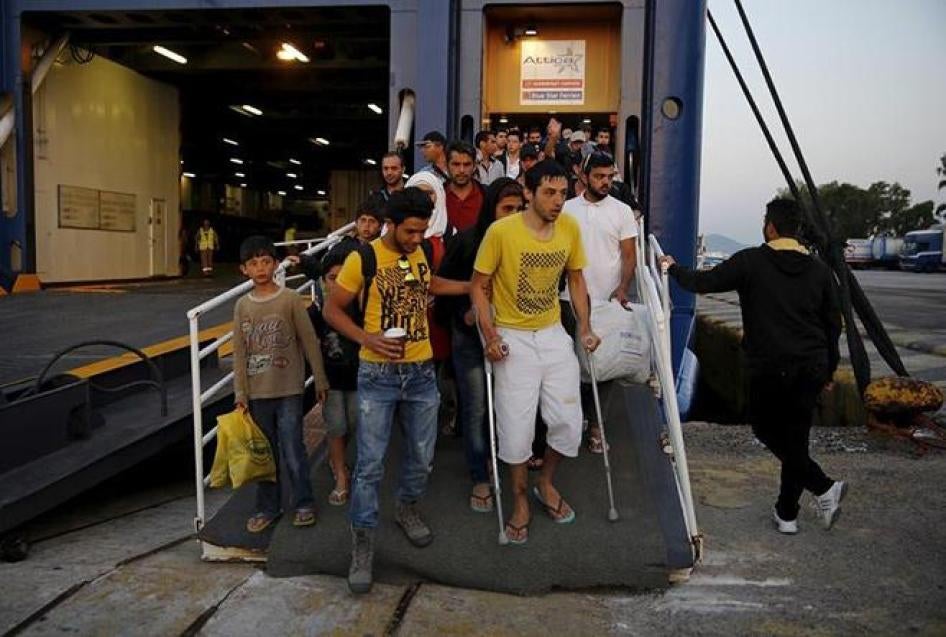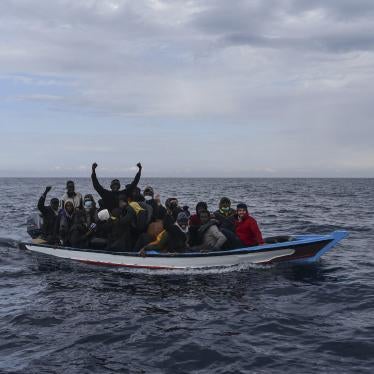(Brussels) – European Union leaders should make an unambiguous and united commitment to ensuring that people fleeing war and persecution will find refuge in Europe, Human Rights Watch said today. Heads of state from the 28 EU countries will meet in Brussels on June 25 and 26, 2015, to discuss European Commission proposals for a “European Agenda on Migration.”
“EU leaders should agree to concrete actions to show the world they uphold the values the European Union was founded on,” said Judith Sunderland, senior Western Europe researcher at Human Rights Watch. “From east to west, and south to north, we need, first and foremost, to see solidarity with the women, men, and children forced to risk their lives to seek safety in Europe.”
There is broad agreement among EU member states on many of the European Commission’s proposals that focus on limiting arrivals to the EU, tackling smuggling networks, and enforcing returns to countries of origin. Yet two proposals – on refugee resettlement and a fairer distribution of responsibility for asylum seekers already in the EU – have generated controversy in some European capitals, Human Rights Watch said.
Leaked draft conclusions for the summit suggest that EU leaders will commit to the “principle” that all member states will participate in a program, proposed by the commission, to resettle 20,000 recognized refugees over the next two years. This low number contrasts starkly with global needs at a time of protracted refugee emergencies. The United Nations refugee agency, UNHCR, estimates that in 2015, globally almost one million refugees need to be resettled and one in every 122 people on the planet is displaced. UNHCR has asked the international community to resettle at least 130,000 Syrian refugees out of nearly 4 million currently hosted in the Middle East. But so far individual EU countries have pledged to take only a total of 45,000, and fewer than 9,000 have actually been brought to EU territory.
EU leaders are also expected to delay concrete decisions about how and when to relocate asylum seekers from Italy and Greece, two countries facing high numbers of arrivals by sea. The European Commission has proposed a relocation scheme to distribute 40,000 Syrians and Eritreans – 24,000 from Italy and 16,000 from Greece – over the next two years. The draft conclusions indicate that member states will agree by the end of July on how many asylum seekers each member state should take.
The relocation scheme is a modest step needed to correct unequitable distribution of responsibility for asylum seekers, and it is vital for member states to respond generously and promptly, Human Rights Watch said.
Over 100,000 migrants and asylum seekers have crossed the Mediterranean since the beginning of 2015. According to UNHCR, over 60 percent come from Syria, Somalia, and Afghanistan, countries torn apart by war and generalized political violence, or from Eritrea, which is ruled by a highly repressive government. In a recent report, Human Rights Watch documented the human rights abuses driving people to make the dangerous sea journey.
Asylum seekers, including children, from these four countries who arrived in Italy and Greece in May described to Human Rights Watch the indiscriminate fighting, threats from insurgent groups such as the Taliban, Al-Shabaab, and the extremist group Islamic State (also known as ISIS), forced conscription and recruitment by armed groups, attacks on schools, and other abuses that forced them to flee.
EU leaders should fully endorse the European Commission’s plan on refugee resettlement and relocation of asylum seekers to alleviate the disproportionate share of responsibility for sea arrivals on Italy and Greece, and commit each of their governments to provide increased numbers of places for UNCHR’s resettlement plan, Human Rights Watch said. They should also explore other measures to allow safe and legal travel to the EU, including facilitating family reunification and issuing humanitarian visas to enable people in need of international protection to travel lawfully to the EU to apply for asylum or for resettlement admission based on humanitarian criteria rather than the refugee definition.
“With global displacement at an all-time high, it’s frustrating to see EU government foot-dragging over the European Commission’s modest proposals on resettlement and sharing of responsibility,” Sunderland said. “The EU has the capacity to be far more generous, and EU leaders should seize the opportunity in the coming days to demonstrate they have the compassion and the political will as well.”
|
News Release
EU: Bold Steps Needed on Mediterranean Crisis
Increase Refugee Resettlement, Asylum Seeker Relocation
Your tax deductible gift can help stop human rights violations and save lives around the world.
Tags
Most Viewed
-
November 25, 2019
A Dirty Investment

-
June 3, 2025
“They’re Ruining People’s Lives”

-
January 25, 2024
“We’re Dying Here”

-
April 27, 2021
A Threshold Crossed

-
November 19, 2012
Losing Humanity



